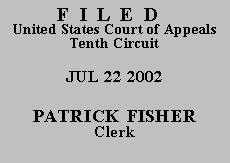

| ROBERT LOUIS JONES, |
|
| v. | |
| MICHAEL V. PUGH, |
After examining the briefs and appellate record, this panel has determined unanimously that oral argument would not materially assist the determination of this appeal. See Fed. R. App. P. 34(a)(2). The case is, therefore, ordered submitted without oral argument.
Robert Louis Jones, a federal prisoner proceeding pro se, seeks leave to proceed in forma pauperis ("IFP") in appealing the denial of his 28 U.S.C. § 2241 habeas petition. Given Mr. Jones' pro se status, we construe his contentions liberally. See Haines v. Kerner, 404 U.S. 519, 520-21 (1972) (per curiam). We ultimately conclude, however, that, because Mr. Jones has failed to present a "reasoned, nonfrivolous argument on the law and facts" in support of the issue he raises on appeal, DeBardeleben v. Quinlan, 937 F.2d 502, 505 (10th Cir. 1991), we must deny IFP status and dismiss this appeal.
I. BACKGROUND
Mr. Jones' petition suggests the following procedural facts. In 1994, Mr. Jones pleaded guilty to violation of 18 U.S.C. § 2119 (carjacking) in the United States District Court for the Western District of Texas. The district court sentenced Mr. Jones to 145 months' imprisonment. Mr. Jones filed a direct appeal, and the United States Court of Appeals for the Fifth Circuit affirmed. Mr. Jones thereafter challenged the validity of his conviction and sentence by filing, in the Western District of Texas, a petition pursuant to 28 U.S.C. § 2255. The relevant district court denied Mr. Jones' § 2255 petition and the Fifth Circuit, on at least one occasion, declined to grant Mr. Jones leave to a file a second or successive § 2255 petition.
Mr. Jones next filed, in the District of Colorado (the district in which Mr. Jones is presently incarcerated), a petition pursuant to 28 U.S.C. § 2241. In this petition, Mr. Jones once again sought to challenge the validity of his conviction and sentence. The district court denied the § 2241 petition, and Mr. Jones brought this appeal.
In his appeal, Mr. Jones challenges only the validity of his carjacking conviction. Mr. Jones argues that the carjacking conviction is invalid because, given the holding and reasoning of Jones v. United States, 529 U.S. 848 (2000), the government was required to prove (and failed to do so) that the vehicle stolen by Mr. Jones was involved in interstate commerce "at the . . . time petitioner attempted to take the vehicle." Aplt's Br. at 3.
II. DISCUSSION
Mr. Jones attacks the validity of his carjacking conviction. Challenges to the validity of one's conviction ordinarily must be brought pursuant to 28 U.S.C. § 2255 rather than 28 U.S.C. § 2241. See Bradshaw v. Story, 86 F.3d 164, 166 (10th Cir. 1996) ("The exclusive remedy for testing the validity of a judgment . . . , unless it is inadequate or ineffective, is that provided for in 28 U.S.C. § 2255. . . . A petition under 28 U.S.C. § 2241 attacks the execution of a sentence rather than its validity . . .") (internal quotation marks omitted). This distinction is significant, in part, because § 2255 petitions must be filed in the district court that rendered the contested conviction, whereas § 2241 petitions must be filed in the district in which the petitioner is confined. See Bradshaw, 86 F.3d at 166 ("A 28 U.S.C. § 2255 petition . . . must be filed in the district that imposed the sentence . . . . A petition under 28 U.S.C. § 2241 . . . must be filed in the district where the prisoner is confined.").
Ordinarily, then, we would be required to dismiss Mr. Jones' § 2241 petition in order that he might re-file that petition, correctly captioned as a § 2255 petition, in the United States District Court for the Western District of Texas. Recognizing this obstacle, Mr. Jones endeavors to invoke the exception, alluded to in Bradshaw, by which a petitioner may utilize a § 2241 petition rather than a § 2255 petition in those situations in which the § 2255 remedy is "inadequate or ineffective." Id. In support of his claim that his § 2255 remedy is inadequate or ineffective, Mr. Jones alleges that the United States Court of Appeals for the Fifth Circuit has refused to address his argument absent the payment of a one hundred dollar "fine." Rec. doc. 9, at 2 (Response to Order to Show Cause, filed Jan. 30, 2002).
Mr. Jones' argument fails to suggest that the § 2255 remedy is inadequate or ineffective. As we held in Caravalho v. Pugh, 177 F.3d 1177 (10th Cir. 1999), and as noted by the district court below, a habeas petitioner's inability to obtain leave to file a second or successive § 2255 petition fails to render the § 2255 remedy inadequate or ineffective. See Caravalho, 177 F.3d at 1179 ("The mere fact that [a habeas petitioner] is precluded from filing a second § 2255 petition does not establish that the remedy in § 2255 is inadequate."). In order, then, to attack the validity of his carjacking conviction, Mr. Jones is limited to pursuing leave, from the United States Court of Appeals for the Fifth Circuit, to file, in the appropriate federal district court, a second or successive § 2255 petition.
III. CONCLUSION Because Mr. Jones has failed to present a "reasoned, nonfrivolous argument" in support of his contention that his 28 U.S.C. § 2255 remedy is inadequate or ineffective, DeBardeleben v. Quinlan, 937 F.2d 502, 505 (10th Cir. 1991), we DENY Mr. Jones' motion to proceed IFP and DISMISS this appeal.
Entered for the Court,
Robert H. Henry
Circuit Judge
*. This order and judgment is not binding precedent, except under the doctrines of res judicata, collateral estoppel, and law of the case. The court generally disfavors the citation of orders and judgments; nevertheless, an order and judgment may be cited under the terms and conditions of 10th Cir. R. 36.3.